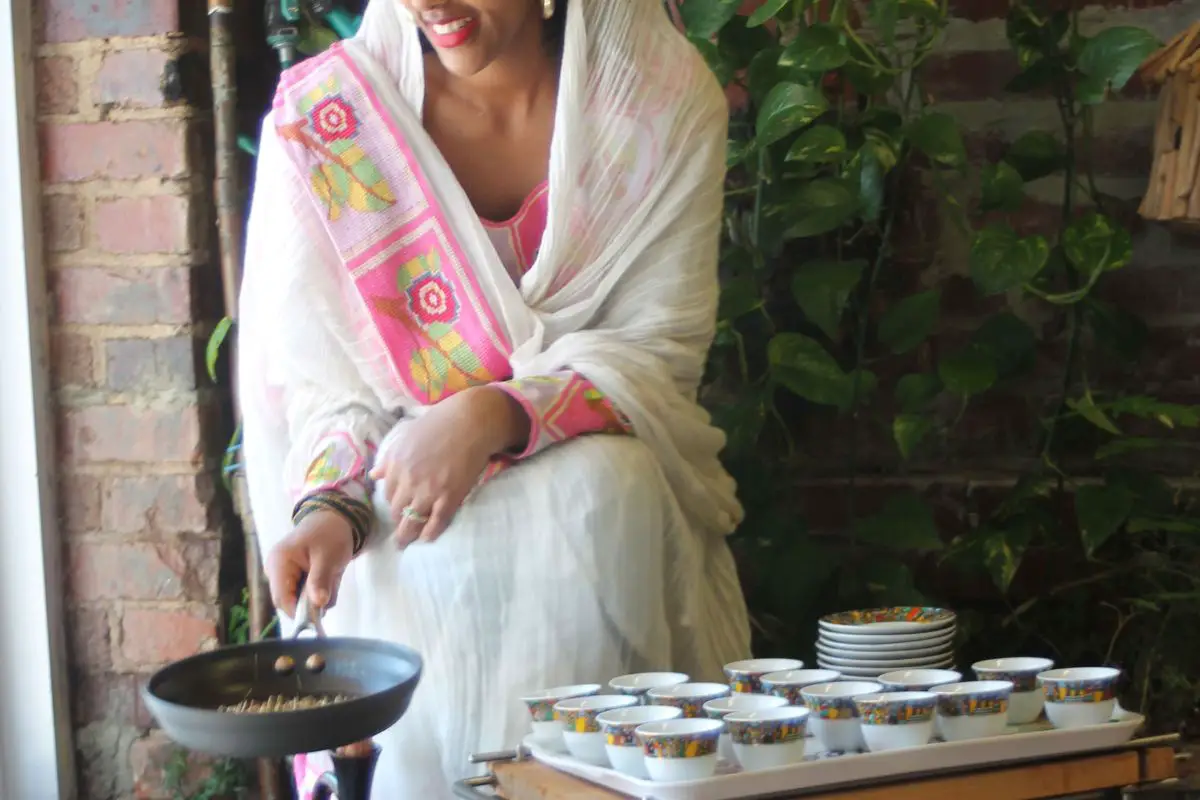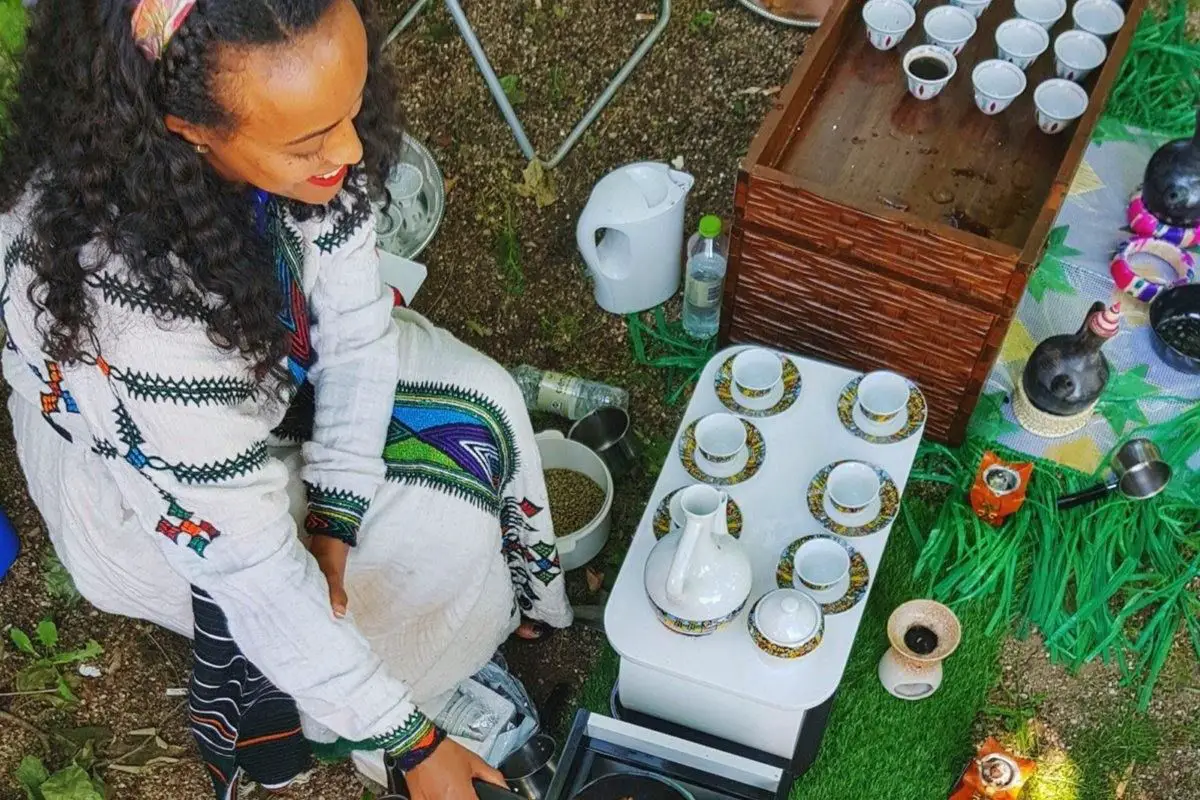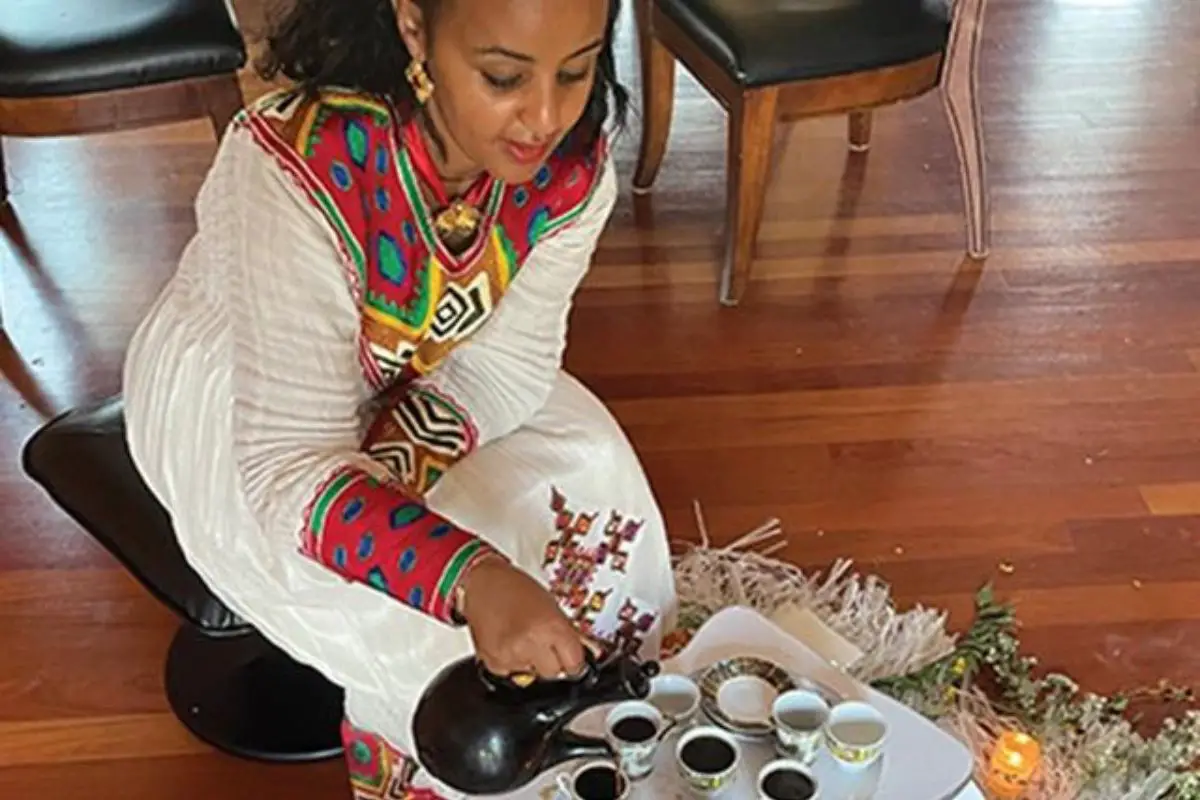In this article, you will learn about the significance of coffee in Ethiopian culture and how it is deeply intertwined with their marriage customs. From its historical origins to its role in present-day Ethiopian society, coffee has played a central role in both the social and cultural aspects of life. The article will explore how coffee is involved in pre-marriage customs, including its symbolism in family connections and approval, as well as the role it plays during the wedding ceremony itself. Furthermore, you will discover how coffee continues to be a prominent feature in post-marriage customs with conflict resolution and maintaining relationships within the family. Finally, the article will also compare coffee-related marriage customs in various Ethiopian regions and discuss the modern adaptations to these age-old practices.

Historical Background of Coffee in Ethiopia
Origin of Coffee in Ethiopia
The origin of coffee can be traced back to the highlands of Ethiopia – specifically Kaffa, the region which is commonly believed to have given the coffee plant its name. It was discovered by a local goat herder named Kaldi, who observed that his goats became more active and energetic after consuming the plant’s wild, red berries.
Upon further investigation, Kaldi discovered that the red fruits of the coffee plant contained small seeds, which would eventually come to be known as coffee beans. He shared his finding with a local monastery, and the monks soon realized that these miraculous beans could help them stay awake and alert during their long hours of prayer.
Once the monks began to roast and brew the seeds, the popularity of coffee started to spread across Ethiopia and eventually throughout the African continent. People used coffee for various purposes, including early morning rituals, ceremonies, social events, and as a source of dietary energy.
As coffee production increased, so too did the trade in coffee beans. By the 17th century, coffee was consumed globally and became an integral part of local economies in numerous countries, beginning with Yemen and spreading across the Arabian Peninsula, Persia, and Latin America.
Traditional Ethiopian Coffee Ceremony
A vital component of Ethiopian culture is the traditional coffee ceremony, which showcases the country’s reverence for the iconic beverage. The ceremony is primarily conducted by women and can be performed for a variety of occasions, both formal and informal.
The process begins with the raw coffee beans being washed and roasted over a charcoal stove, referred to as a brazier, in a small pan called a menkeshkesh. As the beans begin to darken and release their distinctive aroma, they are often passed around directly to the guests for them to appreciate.
Following the roasting process, the coffee beans are ground using a mortar and pestle. The resulting fine powder is then brewed in a traditional clay brewing pot called a jebena. The brewing process requires multiple rounds, during which water is added and removed as it comes to a boil. Finally, the brewed coffee is poured into small, handleless cups called finjal while making sure that no sediment from the coffee grounds comes through.
The traditional Ethiopian coffee ceremony is far more than a simple method of coffee preparation – it is a social gathering for family members and friends to discuss important events, share stories, and enjoy a moment of respite from daily concerns.
Socio-Cultural Significance of Coffee in Ethiopian Society
Coffee plays a pivotal role in the socio-cultural fabric of Ethiopian society. It is deeply intertwined with the people’s way of life, customs, and traditions, being an essential component of daily routines and special occasions alike.
Coffee is consumed communally, encouraging socialization, and strengthening bonds between family members, friends, and neighbors. In rural areas, it is often consumed in the mornings while making plans for the day and sharing information with others.
The practice of conducting a coffee ceremony during a guest’s visit highlights the importance of hospitality in Ethiopian culture. It signifies a warm welcome, respect, and the close bonds between host and visitor, providing an opportunity for conversation and communion.
In addition to being a social beverage, coffee has spiritual significance in Ethiopia. It is consumed during religious ceremonies and has roots in the Ethiopian Orthodox Church, where the faithful often drink coffee to help maintain their focus and alertness during long hours of prayer.
Economically, coffee is vital to Ethiopia’s national income, being the country’s largest export commodity, and the livelihood of millions of farmers and their families depend on it. The Ethiopian coffee industry not only drives the economy but serves as a symbol of national pride.
In summary, coffee holds significant weight in Ethiopian culture, symbolizing social cohesion, hospitality, spirituality, and economic sustainability. The traditional coffee ceremony and the centrality of coffee in Ethiopians’ daily lives bear testament to the enduring cultural importance of the invigorating beverage.
Pre-Marriage Customs Involving Coffee
In many cultures across the world, coffee plays a vital role in pre-marriage customs and traditions. These customs often involve coffee during courtship and engagement periods, making it an essential aspect of families coming together to create new relationships. The symbolic role of coffee in these customs goes far beyond merely being a beverage. It is a medium through which families express unity, signify approval of the couple’s union, and bridge the gap between cultures.
Parental Involvement and Coffee Ceremonies
In many societies, parental involvement is crucial when it comes to pre-marriage ceremonies and practices. In Ethiopian tradition, coffee is an essential element of their culture and family identities. A coffee ceremony known as “Jebena Buna” usually takes place at the bride’s family home when the groom’s family comes to negotiate and discuss the couple’s marriage.
The bride’s mother or elder female family member starts the ceremony by roasting coffee beans and brewing the coffee. Once it is ready, they serve it to the guests in small cups with sugar and snacks. The coffee service goes through three rounds, and each has a specific name and meaning behind it. Throughout the ceremony, the two families discuss, negotiate, and eventually agree on marital issues such as engagement, dowry, and, ultimately, the wedding. The coffee ceremony not only builds a connection between the two families but also allows for the discussion and negotiation process essential for bringing the families together.
In Turkish culture, families take part in a customary coffee-serving ceremony called “Kahve Içmemiz Lazım” when the groom’s family visits the bride’s family to formally ask for her hand in marriage. During this ceremony, the bride serves coffee to her prospective groom and his family. Interestingly, the coffee served to the groom is sometimes made very bitter by adding salt instead of sugar, symbolizing that the bride would like to see how her groom-to-be reacts to a difficult situation.
Coffee as a Symbol of Family Connection and Approval

Coffee serves as a symbol of family approval and a way to create new bonds when it comes to pre-marriage customs in different cultures. For example, in Arab societies, the process of getting engaged or married also heavily involves coffee.
In a typical engagement ceremony known as “Fatihah,” the prospective groom and his family go to the bride’s home bearing gifts and offerings, including coffee. The two families get together, and the elders meet to discuss the marriage proposal over a traditional Arabian coffee called “Gahwa.” If the elders reach an agreement and the bride’s family accepts the proposal, they share the coffee to symbolize the union of the two families.
Requesting a Hand in Marriage Using Coffee Beans
In some cultures, coffee beans are used as a symbol of a marriage proposal. A fascinating example of this custom can be found in Costa Rica, where the tradition of “Pedir La Mano” or “asking for the hand” still prevails. In this tradition, the groom-to-be goes to the bride’s family’s home and hands her father a sack of coffee beans as a gift to ask for his daughter’s hand in marriage. The father accepting the coffee signifies his consent to the relationship, making it an essential part of the relationship’s progression.
In conclusion, coffee plays a significant role in pre-marriage customs across various cultures. Its importance goes beyond being a mere beverage, symbolizing family bonds, connections, and approvals. The symbolic weight of coffee in these customs showcases how deeply entrenched it is in human society and how it continues to unite people even in today’s ever-changing world.
During the Wedding Ceremony
In many cultures around the world, the wedding ceremony is a significant event that encompasses a wide range of rituals and customs that hold deep meaning and symbolism. One such example is the Ethiopian wedding ceremony, which is steeped in tradition and involves various elements that represent love, commitment, and unity such as the prominent role of coffee in the proceedings.
Coffee in Ethiopian Wedding Rituals
Ethiopia is often considered the birthplace of coffee, with the Arabica coffee plant originating in the country’s southwestern regions. It is no surprise then that coffee plays a central role in Ethiopian traditions, including the wedding ceremony. The traditional coffee ceremony is an important aspect of Ethiopian culture and features heavily in the wedding proceedings.
During a traditional Ethiopian wedding, the bride, groom, and their families gather together to share in the coffee ceremony, which is performed by a skilled woman, often a close friend or family member of the bride. This individual is referred to as the “buna madhanit,” which translates to “coffee maker” in Amharic, the official language of Ethiopia.
The ceremony begins with the buna madhanit roasting the coffee beans while incense is burned to create a soothing atmosphere. Once the beans are roasted, they are ground using a mortar and pestle, and then brewed in a traditional clay pot known as a jebena. The entire ceremony takes place on a bed of fresh grass, which symbolizes fertility.
Symbolism of Coffee in Marriage Commitment
The coffee ceremony is rich in symbolism and meaning. For one, the process of brewing a strong, rich cup of coffee represents the commitment and hard work required for a successful marriage. Just as coffee is brewed by combining various elements – the beans, water, and heat – a successful marriage requires the union and cooperation of both partners.
Furthermore, the sharing of coffee during the wedding ceremony symbolizes the couple’s willingness to provide for one another, ensuring each other’s sustenance and well-being throughout their married life. As coffee is considered to be one of life’s necessities in Ethiopian culture, the act of serving it to one another is a gesture of dedication and love.
Unity and Bonding through Sharing Coffee
Another significant aspect of the coffee ceremony lies in its ability to bring people together. To enjoy a cup of coffee is an essential social activity in Ethiopian culture, as it fosters conversation, strengthens connections, and nurtures a sense of community. By incorporating the coffee ceremony into their wedding, the newlyweds are inviting their family and friends to witness and share in their union and the journey that lies ahead.
During the coffee ceremony, the bride and groom serve coffee to one another, as well as to their parents and other close family members. This tradition not only reinforces the bond between the couple but also serves as a gesture of gratitude and respect towards their families. By offering coffee to those closest to them, the newlyweds acknowledge the important roles that their family and community play in their lives and express their hope for a continued support throughout their marriage.
In conclusion, the coffee ceremony is a crucial part of the Ethiopian wedding tradition, with its rich symbolism drawing parallels to the commitment, unity, and support required for a successful marriage. As both the bride and groom, along with their families and friends, partake in this ceremony, they are reaffirming their bonds and setting a strong foundation for the future of their lives together.
Post-Marriage Customs Involving Coffee
The tradition of coffee has played a significant role in various cultures around the world. One of the aspects of life where coffee customs have been prevalent is in post-marriage customs. This article will delve into the different post-marriage customs involving coffee, how these customs reaffirm relationships within the family, resolve conflicts through coffee ceremonies, and the continuation of coffee practices in the daily lives of married couples.
Reaffirming Relationships within the Family
In many cultures, coffee plays a vital role in bringing family members closer and fostering a sense of belonging. For instance, in Ethiopian culture, coffee ceremonies are often held within the household after a couple has been married. These ceremonies involve a meticulous process of roasting, grinding, and brewing coffee beans. Once the coffee is ready to serve, the wife offers the coffee first to her husband and then to other family members present, beginning from the eldest to the youngest.
This act of offering coffee symbolizes the wife’s respect and love for her family members. It also serves as an affirmation of familial relationships by embracing and sharing the warmth and comfort of a shared home. As time goes by, these coffee ceremonies are held frequently to maintain strong bonds among family members.
In some Middle Eastern cultures, like Yemen and Saudi Arabia, the importance of coffee transcends beyond the family as well. Newly married couples, accompanied by their families, visit the houses of their neighbors and friends, sharing coffee and sweets as a way of fostering relationships and bonding with the community.
Conflict Resolution through Coffee Ceremonies
Another fascinating aspect of post-marriage coffee customs is the role they play in resolving conflicts among family members. In Ethiopian culture, if there is a disagreement or a misunderstanding between a couple, it is customary for the wife to invite her husband to a coffee ceremony. This gesture indicates her willingness to discuss and resolve the issue at hand, and the husband is expected to accept the invitation in the spirit of cooperation and understanding.
In some cases, a neutral third party or an elder is invited to mediate during the coffee ceremony, helping both parties find a common ground and reach a resolution. These practices highlight the importance of communication and mutual respect within a marriage and show how sharing a cup of coffee can serve as a bridge to harmony and unity.
Continuation of Coffee Practices in Daily Life
The presence of coffee in post-marriage customs does not end with grand ceremonies and rituals. Instead, it becomes an integral part of the couple’s daily life. In Brazil, for example, a married couple is expected to share their first cup of coffee together in the morning, symbolizing the beginning of a new day and life as one united entity. The simple act of enjoying coffee together, discussing plans for the day, and sharing a moment of peace, helps to nurture a bond of love, understanding, and support between partners.
In many other cultures, drinking coffee with family and guests is a means of showing hospitality and taking part in a long-standing tradition of building and maintaining social connections. The essence of these customs is to continuously reaffirm relationships, not only with spouses but also with the extended family and the community.
In conclusion, the role of coffee in post-marriage customs highlights its significance in strengthening relationships, fostering communication, resolving conflicts, and sharing the beauty of life with loved ones. As people from different cultures open their homes and hearts to one another to share this aromatic beverage, coffee becomes much more than just a drink – it turns into a powerful symbol of love, unity, and community.
Comparison with Other Ethiopian Marriage Customs

Ethiopia, known for its diverse culture, is home to over 80 ethnic groups, each of which has its unique and rich tradition of celebrating marriages. As a result, there is a vast array of marriage customs practiced throughout the country, varying between different ethnic groups and regions. While coffee ceremonies play a significant role in Ethiopian marriage traditions, it is important to note that several other customs and practices contribute to the richness of Ethiopia’s cultural heritage.
Diversity in Ethiopian Marriage Practices
One of the unique features of Ethiopian marriages is that they are not solely based on romantic love, but also serve as an important social and economic contract between families. Traditional marriages are arranged by families, with a strong emphasis on kinship ties and lineage. Diverse practices among various ethnic groups include payment of bridal dowry, matchmaking by family members, and engagement ceremonies that involve the exchange of gifts.
The Amhara and Tigray people are known for their elaborate wedding ceremonies, which span over several days and involve colorful processions, dancing, and feasting. Marriage negotiations among these groups often include multiple meetings between the two families, ultimately leading to the establishment of a new bond.
In contrast, the Oromo people, who comprise the largest ethnic group in Ethiopia, observe a marriage custom known as “absuma” that involves the marriage of close cousins, reducing marital negotiations’ complexity and avoiding the payment of bridal dowry.
Among the Afar people, a traditional practice called “Gafili” sees the bride and groom’s families exchanging gifts, usually consisting of goats or camels, as part of the marriage agreement. The bride is then escorted to the groom’s family after a symbolic agreement has been made.
It is essential to note that Ethiopian marriage customs and ceremonies have evolved and continue to evolve, influenced by modern trends and globalization.
Role of Coffee Ceremonies in Various Ethiopian Regions
Coffee ceremonies play a vital role in Ethiopian culture and are particularly significant in marriage customs. In many regions, marriage celebrations include a special coffee ceremony where the bride and groom’s families come together for a bonding experience.
During this ceremony, the bride’s family hosts the guests, roasts coffee beans, and prepares traditional Ethiopian coffee. The preparation process itself is considered a ritual, with the hostess grinding the beans by hand, followed by brewing the coffee in a “jebena,” a traditional clay pot.
Coffee is then poured into small cups called “sini” and is passed around to the guests. This serves as a symbol of unity and respect among the families, unmistakably marking the occasion as a significant milestone in their relationship. In some Ethiopian communities, the coffee ceremony is an essential step of the wedding celebration, representing the union of the families.
Modern Adaptations to Coffee and Ethiopian Marriage Customs

As Ethiopia adopts modernity, so do its marriage practices, which have evolved to accommodate contemporary trends and preferences. Today, many Ethiopian couples have incorporated western customs in their marriages, such as showcasing white wedding gowns, hosting their weddings at hotels, and booking professional photographers.
Nonetheless, the importance of traditional marriage customs, such as the significance of the coffee ceremony, continues to be treasured. Many couples choose to include the coffee ceremony as part of their wedding events, allowing them to hold on to their cultural heritage while incorporating contemporary elements. In urban areas, it is common to find wedding organizers who offer specialized coffee ceremony services as part of their wedding packages.
Furthermore, the coffee ceremony transcends the confines of Ethiopia, and as the Ethiopian diaspora has grown, they have taken this cherished tradition with them. As such, coffee ceremonies are now practiced globally by Ethiopians, reinforcing their connections to their cultural roots and familial bonds.
In conclusion, coffee ceremonies play a crucial role in the diverse marriage customs of Ethiopia. They provide a unifying and bonding experience between the bride and groom’s families, regardless of region or ethnic background. As Ethiopian marriage customs continue to evolve, the tradition of the coffee ceremony remains a vital aspect of the culture and a proud symbol of Ethiopia’s rich heritage.
FAQs on The Role of Coffee in Ethiopian Marriage Customs
Q: What is the importance of coffee for Ethiopian marriage customs?
A: Coffee serves a significant role in Ethiopian marriage customs as a symbol of hospitality, respect, and culture. The coffee ceremony creates an atmosphere of unity between families and sets the stage for respectful and successful negotiations.
Q: How does the Ethiopian coffee ceremony ensure the building of a relationship between the couple and their families?
A: The Ethiopian coffee ceremony promotes relationship-building through collaboration, conversation, and camaraderie. It fosters a social environment and symbolizes a union beyond the marriage itself- that of the future couple’s families merging as one.
Q: What are the responsibilities of the bride in terms of the coffee ceremony during the engagement?
A: The bride-to-be is responsible for performing the coffee ceremony to demonstrate her respect and well-wishing for her future in-laws. This ceremony involves washing, roasting, grinding, brewing, and serving the coffee to the groom’s family, showcasing her skills in hospitality.
Q: Why is presenting coffee beans to the bride’s family considered essential during the marriage proposal?
A: Presenting coffee beans to the bride’s family signifies the prospective groom’s commitment and affirms his ability to provide for his future bride. It is a gesture of goodwill and sets a positive tone for the discussions of marriage and dowry.
Q: What role does the coffee ceremony play during the consummation of an Ethiopian marriage?
A: The coffee ceremony during the consummation of the marriage acts as a unifying force, bringing both families together in a peaceful atmosphere. It helps to build trust, fosters open communication, and ultimately aims to ensure harmony between the new couple and their families.
Q: Are there any particular types of coffee used in Ethiopian marriage customs?
A: Although there is no specific type of coffee designated for marriage customs, preference leans towards high-quality Arabica coffee, which originates in Ethiopia. The selected beans reflect respect for the ceremony and its importance in Ethiopian culture.